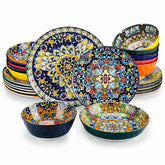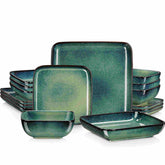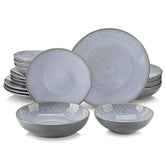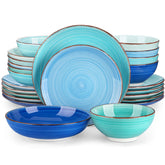Reactive Glaze Dinnerware Buying Guide: How to Choose Unique Tabletop Art
Navigation
- What is Reactive Glaze Dinnerware and why choose it?
- Key Characteristics of Reactive Glaze Dinnerware
- How to Choose the Right Material
- How to Inspect Craftsmanship and Glaze Quality
- How to Evaluate Practical Features
- Top Brands for Reactive Glaze Dinnerware
- Essential Tips Before Purchasing Reactive Glaze Dinnerware
- Conclusion
Check out our stunning guide on how to choose the right reactive glaze dinnerware. Learn more about artistic designs, materials, sturdiness, and how to select artistic plates, bowls, and an entire set of dinnerware.
Dinnerware is not only an everyday object that allows preparing, serving, and eating food but also a part of your dining experience. These few pieces of dinnerware create an amusing ambiance, enhance the looks of the table setting, and also provide talking points. Frequently used for its appealing artistic and hand-crafted aesthetic, reactive glaze dinner wear has been characterized as having a stunning look. Every piece is different from the other and brings to your table an unmatched feel that makes each piece one of a kind.
This comprehensive buyer's guide will equip you with all the essential knowledge you need to get started and acquire a perfect set of reactive glaze dinnerware.
What is Reactive Glaze Dinnerware and why choose it?
Reactive glaze is a finishing technique that is incorporated into the surface of the ceramic dinnerware. When the paint is fired, it literally melts into the piece, interacting with the clay in such a way as to give diverse outcomes, such as coloration, surface texture, and star patterns. This chemical combination results in an amazing work of art, for example, smooth gradients, dots, or lines.
The dinner set is completely unique as no two plates use the same set of reactive glaze designs and textures, making them perfect for those who appreciate having one-of-a-kind dinnerware. Reactive glaze is applied mainly on stoneware or porcelain making those materials to become even more beautiful and unique.
Aesthetic Appeal
Reactive glaze dinnerware simply takes tableware from the ordinary to the exceptional. These specific patterns and surfaces will add to the looks of your table whether you are making preparations for a business dinner or having a family meal.
Handcrafted Feel
Some of the reactive glaze pieces give a raw look of the artisanal works; thus giving you a feeling that you are dealing with traditional pottery works. Use this style with farmhouse, bohemian, and natural table settings.
Versatility
Reactive glaze dinnerware reflects a number of styles and can be used for any occasion. The ideas range from cut-out effect patterns to soft touch patterns, loud and large designs, to small and devastating patterns.
Durability
Reactive glaze dinnerware items are high quality and incredibly tough to break. Reactive glazes in stoneware and porcelain bowls can be quite chip-resistant, and many pieces can be used daily.
Key Characteristics of Reactive Glaze Dinnerware
An identification of the major characteristics of reactive glaze dinnerware is essential when shopping for dinnerware. Here are key characteristics:
Uniqueness
Every one of them is different in terms of color and pattern, so every object does not look the same. This uniqueness makes your collection endearing and interesting.
Natural Aesthetic
The structure of reactive glaze seems to be a natural development, which is perfect for nature inspired table settings.
Color Dynamics
Angular chromatics that change with the range of light is a typical feature of the reactive glaze.
Handcrafted Quality
Some of the blemishes, such as ripple marks in the glaze, drips, and even speckles, are put there deliberately.
How to Choose the Right Material
Reactive glaze dinnerware has become popular and it is mainly made from porcelain or stoneware. Glass has benefits as well as disadvantages, likewise with each material, so consider your lifestyle and habits in regard to eating.
Porcelain
Porcelain has a glossy, polished, and light appearance.
Porcelain should ideally be used for formal dinners, special occasions, or contemporary place settings.
Porcelain is less scratch-resistant but can be more sensitive than Stoneware.
Most porcelain dishes and kitchenware utensils are dishwasher-safe, but washing them with your hands will keep their glaze intact.
Stoneware
Stoneware sets are heavier, more rustic, and have an earthier look than porcelain dinner sets.
Stoneware is appropriate for daily use or a very relaxed setting in terms of table settings.
Stoneware is not prone to chips and scratches, and therefore, this material is appropriate for families or regular use.
Stoneware offers dishwasher-friendly plates, bowls, and dishes, but one needs to check the manufacturer's guidelines.
How to Inspect Craftsmanship and Glaze Quality
The quality of the glaze and the kind of craftsmanship the artist puts into it will determine the longevity and outlook of your dinnerware. Here is what to look for:
Glaze Application
The glaze should be properly and uniformly distributed on the surface, liberated from bubbles or cracks.
Make sure that the rims and the bases are smooth enough to have with your hands.
Some variations are normal, but there is supposed to be a more or less unifying theme or style in the design.
Durability
Dinnerware exposed to high temperatures exhibits strength and is not easily susceptible to cracks or chips. You should choose dishes that are high-fired or have kiln-fired textures.
Safety Standards
Make sure that the glaze is free from lead and cadmium in case the dinnerware is used to serve food. Some of this information is found on the packaging especially where reputable brands include safety certifications.
How to Evaluate Practical Features
Despite its exquisite looks, reactive glaze dinnerware can and should be functional. Here are some practical considerations:
Size and Weight
Dinnerware should fit in your cabinets and your dishwasher without necessarily needing to be stacked or piled on top of each other.
While the larger dinner sets may offer a more tangible and solid feel to them, they might be difficult to move should, for instance, be too heavy for children or elderly family members.
Microwave and Dishwasher Safety
Ensure that the dinnerware is microwave-safe, especially if you will be reheating your foods often in the microwave.
Contrary to the majority of reactive glazed pieces, it is wiser to wash with hands in order to avoid loss of the glaze layer.
Stackable
In case there is a shortage of space, it is important to select some dishes that are organized conveniently without rocking on the bottom surface.
Top Brands for Reactive Glaze Dinnerware
Here are a few highly regarded options:
vancasso
vancasso is popular for artistic and durable dinnerware designs such as the reactive glaze dinnerware with special colors and impressive patterns.
Denby
Denby's reactive glaze collections combine traditional craftsmanship with contemporary styles having earned them a trusted name in the stoneware world.
Mikasa
Mikasa offers dinner sets featuring subtle reactive glaze finishes. They are appropriate for formal occasions.
Handmade Artisans
Locally, try to find someone that makes reactive glaze pieces and handcraft your own, unique reactive glaze pieces.
Essential Tips Before Purchasing Reactive Glaze Dinnerware
Whether you're new to reactive glaze dinnerware or expanding your collection, these practical tips will help you make smart choices for your investment:
- Look at pieces under good lighting to see how they are realized in actual colors and textures.
- Find your favorite patterns and compare different pieces. If possible, visit a physical store where you can see and feel the dinnerware.
- Think about how the new pieces will work with your existing dinnerware.
- Don't take the most extreme cheap options that can put your safety or quality in question.
- Understand Return Policies. Before buying reactive glaze dinnerware, check the return policy. Inspect for true defects (chips, cracks) upon arrival and photograph issues. Note fees, keep packaging, and be sure before committing.
The true beauty of reactive glaze dinnerware lies in its deliberate imperfections - each piece tells its own unique story through subtle variations in color, pattern, and texture. These "imperfections" are actually marks of authenticity that make your collection distinctly yours.
Think of each piece as a small canvas where chemistry and artistry meet: the way colors blend unexpectedly, how the glaze pools slightly deeper in certain areas, or how patterns emerge differently across each surface. These natural variations aren't flaws - they're signatures of the reactive glazing process that make your dinnerware collection truly one-of-a-kind.
Conclusion
By choosing reactive glaze dinnerware, you get an opportunity to put your own artistry on your table. If you pay attention to them, you will learn their characteristics, incorporate the material and craftsmanship, believe in details, and choose reputable brands. Reactive glaze dinnerware makes your table setting functional and beautiful.














